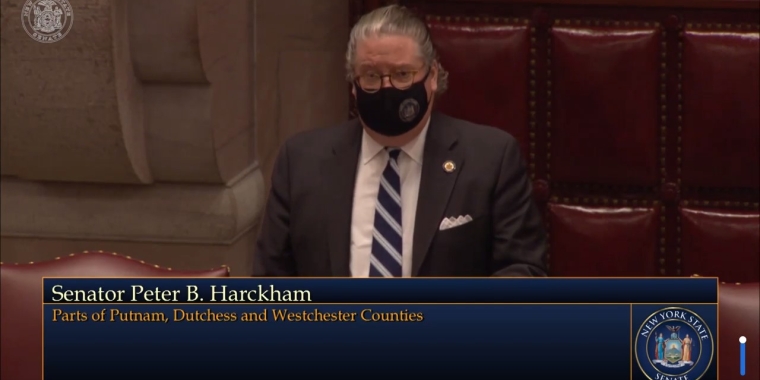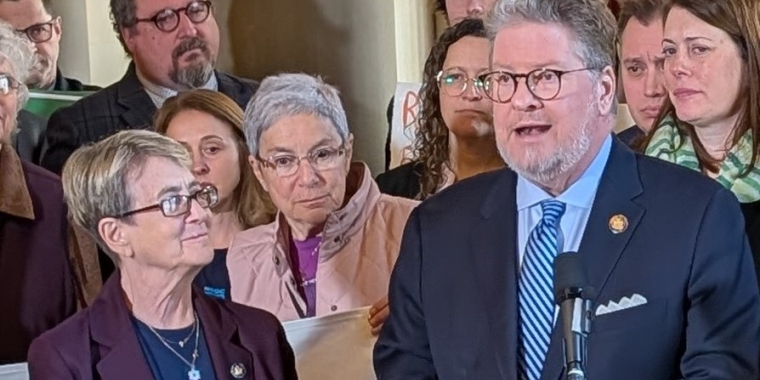
Harckham, Senate Pass One-House Budget Resolution for FY2022
March 15, 2021
-
ISSUE:
- 2022 One-House Senate Budget Resolution
- Combating COVID-19 and Protecting New Yorkers
- Investing in Our Communities

Albany, NY – New York State Senator Pete Harckham and members of the Senate passed the one-house budget resolution for FY 2022 today, which will deliver emergency aid to help New York recover from the Covid-19 pandemic, fund essential services and provide more financial support for working and middle-class families.
All in all, the Senate adds $15 billion in new investments that will empower New Yorkers hardest hit by the pandemic—while still delivering another year of middle-class tax relief.
“The Senate’s one-house budget resolution proposes a massive investment in the people of New York,” said Harckham. “Having reckoned with serious challenges this past year, it is now time to take what we have learned and build a foundation for a healthier economic future, with shared opportunities and prosperity for all of our residents.”
Put simply, the Senate resolution:
- Increases total school aid by $5.7 billion;
- Provides billions in residential and commercial rental and foreclosure assistance;
- Restores critical funding to our health care system;
- Jumpstarts the state economy with investments in transportation and small businesses;
- Protects against AIM funding cuts to struggling municipalities; and
- Advances the $3 billion Clean Water, Green Jobs, Green New York Environmental Bond Act.
A number of initiatives in the one-house resolution stem from legislation introduced by Harckham. This includes an additional $500 million in Small Business Assistance Grants, which will help struggling small businesses get back up and running as New York reopens. Also, the authorization of a special incentive for current government employees to take an early retirement in certain cases at local option, which Harckham has been pushing for, is part of the Senate proposal.
The Senate proposal also includes nearly $20 million in funding restorations to critical programs operated out of the Office of Addiction Services and Supports (OASAS) to help New Yorkers struggling with addiction, which Harckham, the chair of the Senate Committee on Alcoholism and Substance Abuse, advocated for.
Harckham noted that more than 80% of the substance use prevention, treatment and recovery program providers recently surveyed said that staff layoffs and service cuts were inevitable because of state funding cuts to their programs that began last summer, and added, “We need to be strengthening services and increasing resources during New York’s opioid crisis in order to save lives.”
Another bill sponsored by Harckham included in the one-house proposal will require State and local correctional facilities to establish a medication assisted treatment program for individuals with a substance use disorder.
The Senate’s one-house proposal asks the wealthiest New Yorkers to pay their fair share rather than balancing the budget on the backs of working families. First, the top state personal income tax rates on families making over $2 million annually will be increased, as will the corporate franchise tax. A new one percent surcharge on capital gains income for the state’s wealthiest taxpayers will be put in place, along with a two-percentage increase of the estate tax rate. And an additional $247 million will be raised through legalization of mobile sports wagering.
Some highlights of the Senate one-house budget resolution, by category:
Education
- Unprecedented $5.7 billion (20.5%) increase in total School Aid for lower education;
- $1.37 billion Foundation Aid increase and a commitment to a three-year phase in of Foundation Aid, ensuring that all districts will receive their full Foundation Aid by the 2023-24 school year. Every district is guaranteed a 2 percent increase this year, with at least 60 percent of their full allocation.
- Restoration of the executive’s $1.35 billion cut to STAR reimbursements to school districts.
- $500 million to fully fund four-year-old full-day Pre-K statewide.
- Increased funding for Special Act schools, 853 schools, 4201 schools, and 4410 schools who have suffered enrollment and funding declines due to the Covid-19 pandemic.
Middle Class Tax Relief
- A new personal income tax credit, known as a “circuit breaker,” to reduce the cost of property taxes for working and middle-class taxpayers who pay more than six percent of their income in property taxes. This program will lead to approximately $400 million in tax relief for overburdened homeowners.
- Continued support for the ongoing middle-class tax cuts, giving working and middle-class families $394 million in tax relief in the coming year.
- A cap on delinquent property taxes for owner-occupied residential properties to a maximum of 7.5% per year.
Keeping New Yorkers Healthy
- An additional $624 million to increase the minimum wage for the lowest paid home health care workers, who have not seen a raise in many years and who have borne the brunt of the Covid-19 pandemic by working long hours at great personal risk.
- Restoration of $180.5 million in Medicaid cuts to hospitals, $74.25 million to long term care, $60 million to mainstream managed care, and millions more to various other Medicaid-supported programs.
- $135.2 million restored to critical public health programs.
- $200 million for acute care facilities and nursing homes to increase nurse staffing levels
- $328.5 million for residential health care for medically fragile children and young adults.
- $27 million into the Community Services for the Elderly Program to help clear waiting lists and keep seniors out of nursing homes.
Bringing Our Economy Back to Life
- An additional $100 million to the New York State Council on the Arts.
- $500 million for Commercial Rent Relief, which will help thousands of businesses
- An additional $2.1 billion to establish an Excluded Worker Fund to provide unemployment benefits to workers who lost their jobs during the Covid-19 pandemic but who were ineligible to receive Unemployment Insurance.
Keeping New Yorkers in Their Homes
- Directs $750 million to the New York City Housing Authority and $200million for statewide public housing authorities, which have suffered decades of neglect.
- $400 million in supplemental rental aid for struggling working- and middle-class tenants across the State.
- $200 million for a Housing Access Voucher Program to help New Yorkers find permanent housing with a cash subsidy to low-income individuals and families who are homeless or facing an imminent loss of housing.
- $200 million for homeowner assistance, making sure that middle-class New Yorkers facing foreclosure can keep their homes, which are their most significant source of wealth.
Affordable and Quality College for All New Yorkers
- Support to both SUNY and CUNY by increasing the maximum TAP award by $1,000
- Restoration of cuts of $46.4 million to SUNY and $26 million CUNY for operating support.
- Restoration of $35.1 million in general operating support for private colleges, also known as Bundy Aid.
For New Yorkers On the Move
- Restoration of $568 million in Executive cuts to Statewide Mass Transportation Operating Assistance, and provides an additional $385 million over last year’s levels.
- An additional $150 million in funds for the Consolidated Local Street and Highway Improvement Program and $100 million for an Urban Road Revitalization Program.
- A supplemental $175 million to support critical infrastructure improvements and the DOT Capital Plan.
- $100 million for Extreme Winter Recovery.
Two crucial concerns—criminal justice reform and environmental protection—were addressed in the Senate one-house budget as well. There will be $250 million to continue the state’s Raise the Age initiative, which ensures that no one under 18 is prosecuted for a crime as an adult; and $23.5 million will be invested in community safety and restorative justice grant programs, with $6 million in new funding provided for upstate Civil and Criminal Legal Services.
Lastly, the Senate one-house budget authorizes a $3 billion Clean Water, Green Jobs, Green New York Environmental Bond Act to fund projects relating to floor risk reduction, preservation of open spaces, climate change mitigation, and water quality improvement.



